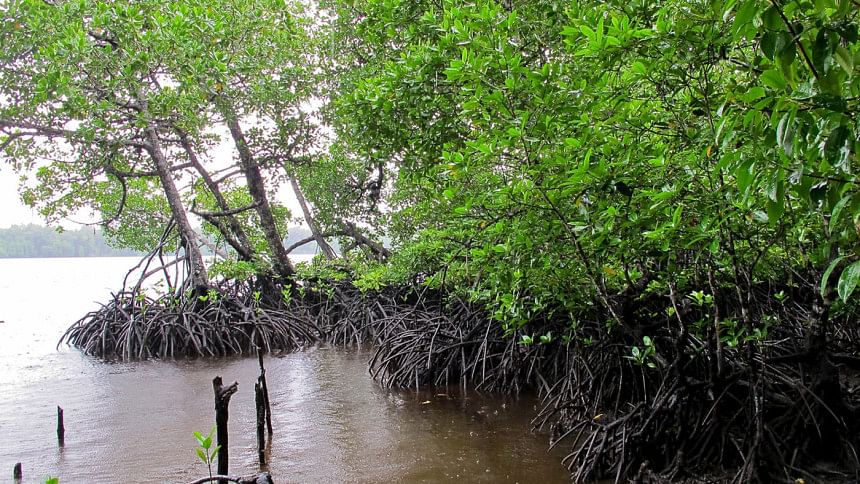Nature-based solutions: The cost-effective climate change mitigation we need

The Covid-19 pandemic has exposed our vulnerabilities, on multiple levels. But with any luck, it will also serve as a wakeup call.
Grubbing out whole ecosystems and perpetuating the grim illegal wildlife trade—not to mention the worst excesses of factory farming—all contribute to dislodging and facilitating deadly new diseases. And at the same time, our routine misuse of antibiotics has compromised our capacity to cope.
The pandemic is a symptom of our abuse of the natural world, but the science couldn't be clearer; this crisis will be dwarfed by others if we continue destroying the natural environment and destabilising our fragile climate.
Last month, the Living Planet Index showed that populations of key species have declined by 68 percent in little more than my lifetime—an evolutionary nanosecond. Hundreds of thousands of species face extinction, from marine leviathans to chameleons small enough to balance on the head of a match.
Every minute, the world loses thirty football pitches worth of forests, making deforestation the second leading cause of climate change.
It is the Lorax writ large—a tragedy. And it is a human tragedy too. A billion people depend on the forests for their livelihood. Roughly the same number of people depend on fish for their survival. When nature's free services fail, it is the poorest who suffer first.
Turning this around is surely the principle challenge of our age. We can do it, if governments step up.
As co-hosts of the next Climate COP, the UK is in pole-position to galvanise global action. On emissions, the market is thankfully racing ahead of the politics, with investment in renewable energy now exceeding investment in fossil fuels. But technology alone cannot prevent climate change.
Nature-based solutions like protecting and restoring mangroves, forests and peatlands could provide a third of the cost-effective climate change mitigation we need, while helping turn the tide on the extinction crisis. Despite this, they attract a measly 3 percent of global climate funding. It makes no sense at all.
So the UK will use our Presidency of COP26 to persuade other countries to put nature at the heart of their climate response.
We have doubled our International Climate Finance, and we will increase our spending on nature.
We are rolling out ambitious programmes—a new 100-million-pound Biodiverse Landscapes Fund to connect critically important landscapes, and the 500-million-pound Blue Planet Fund to restore marine ecosystems. Our Blue Belt initiative is on course to protect an area the size of India around our Overseas Territories, and we are leading the global campaign to protect at least 30 percent of the ocean by 2030.
Money alone won't solve the problem, but governments hold powerful levers to make markets value nature and attach a cost to environmental destruction.
Globally, agriculture causes 80 percent of deforestation, mostly for growing commodities like palm oil, soya, and cocoa. If the top fifty food producing countries follow our lead in replacing their land use subsidies with a system that rewards farmers for environmental stewardship, 700 billion pounds a year—around four times the world's aid budget—would shift to support nature.
And we have launched a world-leading consultation on a due diligence requirement on big companies to remove deforestation from their supply chains. If we can persuade other countries too, this could flip the market to make forests worth more alive than dead.
On September 28 at the UN, our prime minister signed a Leader's Pledge for Nature that the UK has played a leading role in crafting. An ambitious call to action, it recognises the failure of so many previous declarations, and invites every generation to judge leaders on whether they honour their word.
As governments map out their economic recoveries, we have a choice. We can prop up the status quo, locking in decades of carbon emissions and environmental destruction. Or we can choose this moment to profoundly reset our relationship with the natural world.
I am delighted that Bangladesh's Prime Minister Sheikh Hasina was among the leaders to sign up to this pledge. I had the pleasure to virtually visit Bangladesh in August and had a virtual tour of the Sundarbans, the largest contiguous mangrove forest in the world which plays an extremely important role in protecting communities from cyclone damage, and which also sequesters carbon from the atmosphere. This is a prime example of the natural heritage that needs our protection now more than ever. I also spoke to experts who are developing natural solutions to manage climate change impacts such as salt-water intrusion, flooding, and rainfall variability. The UK-Bangladesh partnership on climate action can help develop expertise and apply these solutions more widely, and is an example of the type of international collaboration Prime Minister Sheikh Hasina spoke so passionately about at the United Nations this week.
Lord Zac Goldsmith is the UK Minister for Pacific and the Environment at the Foreign, Commonwealth & Development Office (FCDO) and the Department for Environment, Food and Rural Affairs.

 For all latest news, follow The Daily Star's Google News channel.
For all latest news, follow The Daily Star's Google News channel. 



Comments